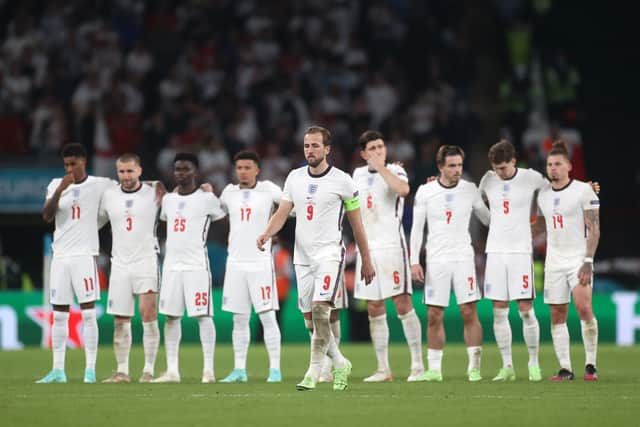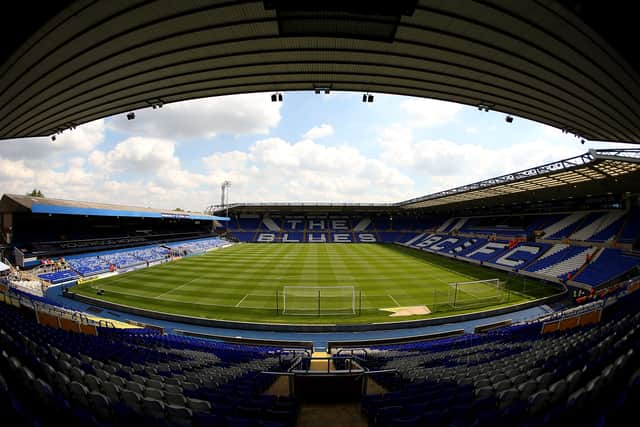Police arrested 8 times more fans at England games during 2020-21 season than before Covid - with majority at Euro 2020
This article contains affiliate links. We may earn a small commission on items purchased through this article, but that does not affect our editorial judgement.
and live on Freeview channel 276
Eight times as many football fans were arrested at international games in England and Wales last year compared to pre-pandemic matches – despite clubs and pubs being closed for most of the season.
New figures released today (14 October) by the Home Office reveal that 92 football-related arrests were made at international games by police during the 2020-21 season.
Advertisement
Hide AdAdvertisement
Hide AdThis compares to just 12 offences recorded at home international matches during 2018-19, before Covid.
Arrest rate at seven-year high
It means there was a 692% increase in arrests, with arrests the highest for at least seven years. There were 20 arrests in 2019-20, which was also impacted by Covid.
This is despite pubs being closed outside grounds for a large part of the season because of restrictions.
All of the 92 international match arrests last season took place at England national team matches on home turf, with no arrests abroad.
Advertisement
Hide AdAdvertisement
Hide AdThe number of home arrests this year outstripped the combined total for home and abroad arrests for any year since at least 2014-15, when current records began.
Loading....
A staggering 90 people were apprehended just at Euro 2020 matches, which kicked off on 11 June as the nation started to emerge from the pandemic.
The figures include fans of any team arrested in connection with an England or Welsh match.
The highest number of arrests took place as England took on Italy during the final on 11 July.
Advertisement
Hide AdAdvertisement
Hide AdIt was the first time Gareth Southgate’s Three Lions made it to the final of a major football tournament – something which had not been done since the 1966 World Cup.
England were knocked out after facing a 3-2 defeat on penalties.


It was at this same match where police took 39 people into custody, making up for 43% of all Euros 2020 arrests in England and Wales.
A further 28 people were also arrested as the home nation faced Scotland in the group stage, which finished 0-0.
Advertisement
Hide AdAdvertisement
Hide AdArrests were also made as England beat Denmark 2-1 in extra time - with 18 people apprehended.


The most common offences were violent disorder, public disorder, alcohol offences and driving under the influence of drugs.
The Euros 2020 tournament was delayed by a year due to the Covid pandemic.
Wembley Stadium was selected as the venue to host the Euro 2020 final, but the grounds were not at full capacity because of Covid regulations.
Advertisement
Hide AdAdvertisement
Hide AdInstead it ran at 75% capacity for the final, as part of the Government’s testing programme to allow large crowds back to live sporting and music events.
Birmingham City fans top banning orders
The new figures also reveal that Birmingham City fans received the most number of banning orders during 2020-21.
Fans of the championship club were slapped with 27 banning orders, with 17 going to male fans aged between 18 to 34.
Two male youngsters aged between 10 and 17 were also banned.
Loading....
Advertisement
Hide AdAdvertisement
Hide AdThe next top three clubs with the highest number of new banning orders are a mixture of premier league and championship sides.
The data, published on 14 October, shows Liverpool with 18 banning orders, Bolton Wanderers with 17 and National League team Stockport County with 16.
The total across all English and Welsh clubs was 208.
Banning Orders are a measure imposed by a court following a football-related offence.
It aims to prevent violence or disorder at, or in connection, with regulated football matches.


Advertisement
Hide AdAdvertisement
Hide AdBanning orders can last for up to 10 years if immediate imprisonment is imposed and must be for at least six years.
If no immediate imprisonment is ordered, the maximum is five years and the minimum three years.
The 2020/21 season started on 12 September, following a mere seven-week break after the 2019/20 season, which was disrupted by the pandemic.
Many fixtures last season saw no fans in attendance. Fans were only allowed to return to watch live sport in England without any restrictions from 19 July 2021, after social distancing rules were scrapped.
Advertisement
Hide AdAdvertisement
Hide AdThe Premier League has now returned to full stadium capacity when it kicked off on 13 August for the 2021/22 season.
We want to hear from you: let us know what you think about this story and be part of the debate in our comments section below
A message from the editor:
Thank you for reading. NationalWorld is a new national news brand, produced by a team of journalists, editors, video producers and designers who live and work across the UK. Find out more about who’s who in the team, and our editorial values. We want to start a community among our readers, so please follow us on Facebook, Twitter and Instagram, and keep the conversation going. You can also sign up to our newsletters and get a curated selection of our best reads to your inbox every day.
Comment Guidelines
National World encourages reader discussion on our stories. User feedback, insights and back-and-forth exchanges add a rich layer of context to reporting. Please review our Community Guidelines before commenting.
